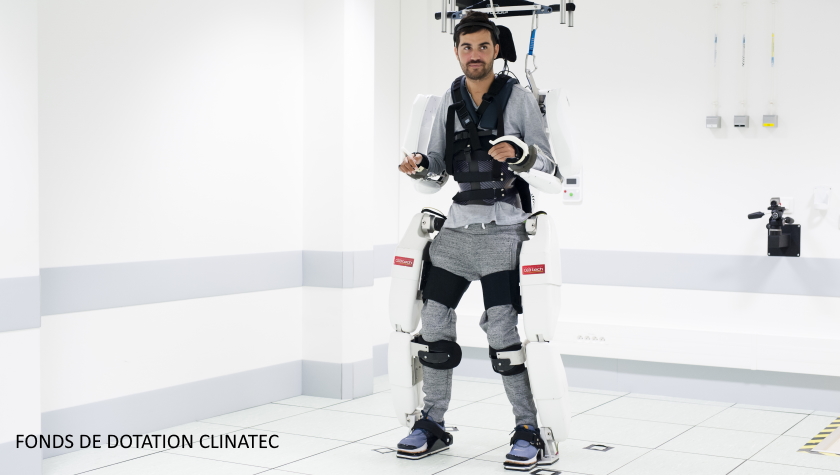Mind-controlled exoskeleton suit allows paralysed man to walk

Researchers in France say a man has been able to control all four of his limbs using a mind-controlled exoskeleton suit, according to a BBC report.
The 30-year-old man – known only as Thibault – was left paralysed from the shoulders down after falling 15m in an incident in a night club four years ago that left him with serious spinal cord damage.
Using the suit developed by researchers at Clinatec and the University of Grenoble, he has been able to move his arms and walk, helped by a ceiling-counted harness to prevent falling and improve balance.
The exoskeleton is controlled by implants on the surface of his brain that capture signals via 64 electrodes that are then beamed wirelessly to a computer, which in turn interprets them and sends instructions to the suit.
He was initially trained to use the device by using the implants to control a virtual avatar in a computer game, before taking on the challenge of using the exoskeleton, says the BBC. A paper on the system has just been published in The Lancet Neurology.
Another 28-year-old man was also in line to test the device but was excluded from the study because of “a technical problem with the implants,” according to the researchers, who note that approximately 20% of traumatic cervical spinal cord injuries result in four-limb paralysis, or tetraplegia.
The approach differs from other projects which use microelectrodes inserted into the brain, and the researchers say their wireless implant approach reduces the risk of complications such as infections as they sit on top of the membrane covering the brain.
It’s also a major step up in technology as most other programmes are focusing on using mind control for a single robotic limb.
Thibault told the BBC: “It was like [being the] first man on the Moon. I didn't walk for two years. I forgot what it is to stand, I forgot I was taller than a lot of people in the room.”
He said the hardest part of the process was learning to control the arms of the exoskeleton.
It is unlikely that Thibault will be able to walk completely independently using the system anytime soon, as that involves precise movements that are currently beyond its capabilities, according to lead researcher Prof Alim Louis Benabid.
Thibault can however use the implants to control a wheelchair, and work is ongoing to develop finger controls that could allow him to manipulate objects.












